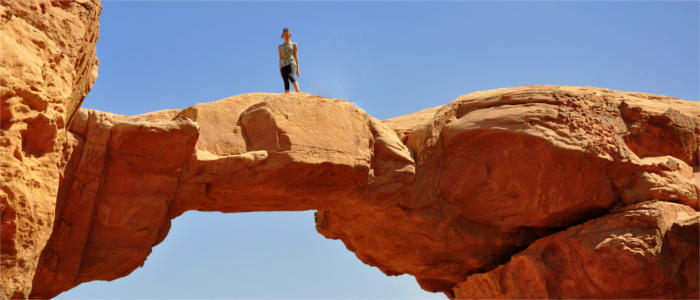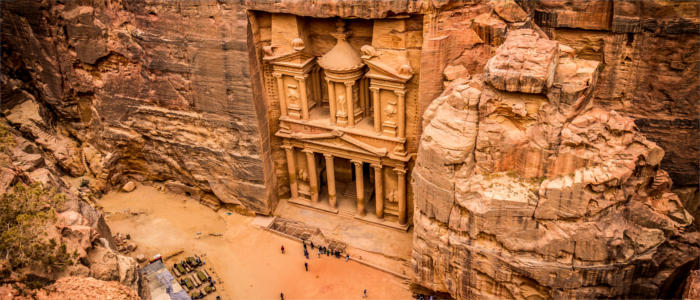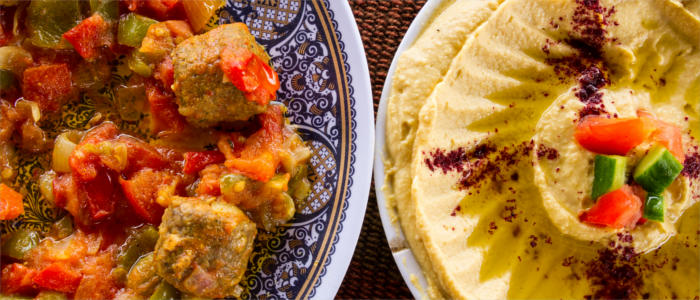Travel Offers
Travelmyne Featureprint
Distance
Current notice: Due to ongoing safety and security concerns, travellers are strongly advised against travelling to the syrian-jordan borderland, as well as to the northeast, the borderland to Iraq.
Jordan - Architecture at the Dead Sea
The white city of Amman, the Dead Sea and the rock city of Petra - Jordan unites several memorable highlights of the Middle East and offers its visitors the wonders of the Orient as well as a lot of history, culture and culinary delicacies.

Geography - The country at the Dead Sea
Jordan is a geographical part of the Middle East and is surrounded by Israel, Syria, Iraq and Saudi Arabia. The Red Sea constitutes a natural border in the south-west. Besides its cultural attractions, Jordan fascinates with its position at the Dead Sea. The country is divided into twelve governorates (provinces). The biggest and most important cities are the capital of Amman, Zarqa and Irbid. Aqaba at the Red Sea is highly recommended to tourists. Since Jordan contains different natural areas, the climatic conditions differ as well. In general, the summer in the desert state is hot and dry, while the winter has pleasant temperatures. There are only a few regions with colder temperatures and more rain.

Nature - From the desert into the water
Jordan has a wide range of interesting and fantastic natural areas. The three most important ones are the green and fertile mountainous region in the east, the vast and dry deserts and the Jordan Valley with the Dead Sea. The mountainous areas are home to wild mountain goats, ibexes and boars but you can also spot jackals and hyenas. Holidaymakers should beware of scorpions in the desert. The country's highest mountain, Jebel Rum, is 1,754 metres high and very popular with climbers. Jordan owes its name to the famous Jordan River, which is the country's most important river. Despite the vast desert landscape, the wadis, visitors can marvel at a Mediterranean flora in several regions. Salt cedars, acacias, rosemary and lavender grow in the Middle Eastern country. In addition, Jordan offers wonderful beaches at the Red Sea, exciting gorges and canyons in the south and bizarre rock formations in the endless orange desert.

Natural sights - Wadi Rum and the Dead Sea
Jordan's best-known desert region is Wadi Rum. Tourists have the opportunity to experience this special landscape at first hand. Great ways of exploring the desert pistes are by Jeep or on a camel. The impressive shapes of the granite cliffs look particularly spectacular at sunrise and sunset. Another highlight is Jebel Rum (also "Jabal Ram"), the country's highest mountain (1,754 m). Although the mountain is relatively low, it acquired renown in the world. Climbers make their way up to the mountain's steep and rugged peak every year. Mount Nebo is also highly recommended. From its top, visitors have a greatview of the Dead Sea and if you have good visibility, you can even see Jerusalem in Israel from here. The country's landmark is the Dead Sea. It is, however, not really a sea but a dammed up lake, which has a salt content of 27 percent due to its high humidification. There is no other body of water on earth with such a high content of salt and minerals. The Dead Sea is the world's lowest point and famous because it is impossible to sink in it. The high salt content creates the necessary buoyancy and gives visitors the feeling of being weightless. In addition, the mineral-bearing mud and the salty air have a healing effect. That is why the Dead Sea is a popular location for relaxation and spa holidays. Holidaymakers who want to go bathing and have fun at the seaside visit the wonderful beaches near the palm city of Aqaba at the Red Sea. The coast is about 30 kilometres long and offers many exciting opportunities for marvellous holidays at the seaside.

Culture - The magic of advanced civilisations
Jordan is one of the oldest settlement areas and fascinates its visitors at first sight. There is hardly any other country which offers this much history and combines the magic of bygone advanced civilisations with the myths and legends of the bible and the oriental atmosphere. Examples are the traces of the crusaders, which you see everywhere, magnificent mosques and the mysterious Madabra Mosaic Map. Every town tells its own, age-old story and is full of traditions. Amman and Aqaba are the country's cultural centres. Visitors are surrounded by old myths and magical stories here. Aqaba, for example, is said to be the biblical city of Ezion-Geber, in which Solomon had the ships for a mighty trade fleet built. The Romans left their mark too in the form of a unique heritage of ruins and temples. The country's main attraction is the inimitable rock city of Petra - a place which you need to see to believe it.

Cultural sights - The rock city of Petra
The Nabataeans built a whole city in the rock and created one of the most impressive structures on earth - Petra. They already had a profound knowledge of architecture and construction 5,000 years ago, which enabled them to built their legacy in stone. The most impressive building is without doubt the city's gigantic treasury. It can only be reached via a narrow gorge, which is less than two metres wide at times. But the way is worth your while. The building still proposes a conundrum. What was it built for? Did anyone live in it? Many questions have not been answered and make the treasury all the more interesting. Besides Petra, the capital of Amman is a real crowd puller. Amman is also called the "White City". It owes this name to the white houses which string together and show the oriental spirit of their inhabitants. Amman is not only the cultural centre but also a great starting point for trips to all the country's worthwhile destinations. If you are interested in exploring the country's south, you should visit the lively palm city of Aqaba. It lies at the Gulf of Aqaba and has access to the Red Sea. Bathers definitely get their money's worth here. Other sights such as the crusader castles are located in Kerak and Shobak. Travellers find the greatest Roman ruins in the Middle East near the city of Jerash.

Experience - A culinary journey
Jordan is still an insider tip among gourmets but more and more travellers realise that a trip to the country is an adventure for their senses, especially their taste buds. Many excellent restaurants, special ingredients and exotic spices create a great diet. Of course, you traditionally eat stuffed vine leaves, kebab and rice with your fingers. Turkish coffee or caffè mocha is very popular, not only with the locals. Another delicacy is the Jordanian beer Amstel, which beer lovers should not miss out on. If you want to take home exciting mixed spices, you should visit one of the great bazaars, called "souqs". Besides sweets and spices, you can buy jewellery made of gold and pearl, small hookahs and all kinds of products for your beauty and health which are made with salt from the Dead Sea. Jordan is generally a great destination for spa holidays. Mud baths and the treatment of skin diseases are particularly popular. The high content of salt and minerals give the body what it loses in everyday life and provide relaxation. Once they are refreshed and cheerful, visitors are ready to experience Jordan's nightlife. There are many clubs and discos in Amman. The district of Sweifieh is particularly popular with party-goers.

Activities - Weightless relaxation
It definitely looks somewhat bizarre when holidaymakers take their newspaper or book and walk straight into the water. This has to do with one of Jordan's most famous photo scenes: reading while floating in the water. Due to the salt's buoyancy, people float on the water's surface like corks. You could even take a nap here - as long as you do not roll on your belly. However, the Dead Sea is not the only attraction which provides entertainment. The Red Sea in the south has a lot to offer too. You can go water skiing and windsurfing at the coast in front of Aqaba. Divers enjoy the great diversity of the Red Sea. The heartland offers great conditions for a climbing tour to Jebel Rum or a long desert safari by Jeep.

Information
Jordan can be travelled throughout the year. The best time for summer holidays is from September to April because the water has a pleasant temperature at this time and has not been heated up by the sun too much. The official language is Arabic but English is common too.
Jordan is particularly popular with adventurers and lovers of culture. In addition, sustainability, health and spa facilities play a major role here.




















